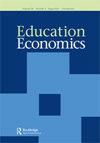代际教育流动——非认知技能的作用
IF 0.9
Q3 Social Sciences
引用次数: 0
摘要
虽然有研究表明,上大学与否与父母的教育有很大关系,但我们对为什么一些潜在的第一代学生上了大学而另一些却没有了解得很少。本文着眼于非认知技能在英国这一弱势群体的大学参与中的作用。研究发现,青少年控制点、学术自我概念、职业道德和自尊水平较高,与代际大学教育流动性呈正相关。我们的研究结果表明,这些技能有助于潜在的第一代学生弥补他们的相对劣势,对男孩来说尤其重要。本文章由计算机程序翻译,如有差异,请以英文原文为准。
Intergenerational educational mobility – The role of non-cognitive skills
While it has been shown that university attendance is strongly predicted by parental education, we know very little about why some potential first-generation students make it to university and others do not. This paper looks at the role of non-cognitive skills in the university participation of this disadvantaged group in England. We find that having higher levels of locus of control, academic self-concept, work ethic, and self-esteem in adolescence is positively related to intergenerational educational mobility to university. Our results indicate these skills help potential first-generation students to compensate for their relative disadvantage, and they are especially crucial for boys.
求助全文
通过发布文献求助,成功后即可免费获取论文全文。
去求助
来源期刊

Education Economics
EDUCATION & EDUCATIONAL RESEARCH-
CiteScore
2.00
自引率
8.30%
发文量
38
期刊介绍:
Education Economics is a peer-reviewed journal serving as a forum for debate in all areas of the economics and management of education. Particular emphasis is given to the "quantitative" aspects of educational management which involve numerate disciplines such as economics and operational research. The content is of international appeal and is not limited to material of a technical nature. Applied work with clear policy implications is especially encouraged. Readership of the journal includes academics in the field of education, economics and management; civil servants and local government officials responsible for education and manpower planning; educational managers at the level of the individual school or college.
 求助内容:
求助内容: 应助结果提醒方式:
应助结果提醒方式:


